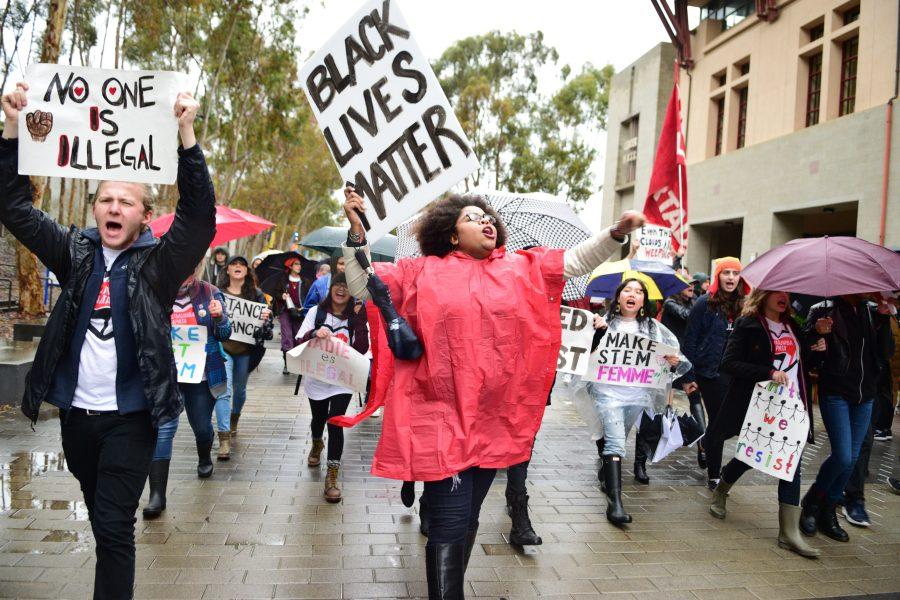Students, faculty, and members of the public filed into Price Center East Ballroom on Wednesday evening to listen to Seton Hall University professor Thomas Healy speak about free speech in the public atmosphere and on college campuses. Healy defined proper counter-speech and outlined the legal and social consequences of any form of speech.
The lecture started with Healy explaining the purposes of free speech in the United States.
“Freedom of speech promotes the search for truth by forbidding the government from shutting off debate on particular topics or disfavoring particular viewpoints,” Healy stated. “It enables individuals to discuss policies openly and ensures they have access to information that they need to make political and personal choices.”
Healy additionally claimed that free speech “enables us to engage in expression vital to our self-fulfillment.”
Professor Healy touched on the common claim that counter-protesters hinder other’s freedom of speech. He argues they should not be restricted since they work in “the system of freedom of speech that relies on counter-speech as the primary alternative to government censorship.”
He described the “chilling effect” as the inability for unpopular opinions to be expressed due to “social backlash.”
Healy made a claim for proper counter-protests by stating, “We should accept the legitimacy of protests, marches, insults, shaming, demonizing, calling out, and even social ostracism since it is not unreasonable for speakers to bear these consequences.”
Despite Healy’s perception on the necessity of counter-protests in the system of free speech, he believes that violence, threats, or any effort to prohibit free speech violate the First Amendment. He reasons that acts of violence are “not legitimate mechanisms for countering ideas one disagrees with” because they “resemble the use of force by the government.”
He used “heckling” as an example of unnecessary counter-speech that aims to silence a speaker through psychological and physical means.
Professor Healy supposed that college students have been labeled as “attackers of free speech.” He said, “It is the result of some legitimately disturbing incidents on college campuses like Berkeley and Middlebury in which some students have responded to speech they disagree with by engaging in violent protests.”
In his statement, Healy referred to the destruction of $100,000 worth of property in response to right-wing Milo Yiannopoulos planned appearance at UC Berkeley in February; he also referred to the attack on Conservative Speaker Charles Murray in Middlebury College in March.
The UC San Diego webpage “Freedom of Speech and Expression 101” outlines the restrictions of free speech on campus. The website itself admits, “Issues pertaining to freedom of speech and expression can be very complicated and confusing.”
The webpage supports free speech at UCSD as it “[encourages] the free flow of ideas and [protects] individuals whose speech may be considered unpopular or dissentious.” Provided on the site are several “content regulations” that are not “protected under the First Amendment.” These regulations include “obscenity, incitement, and fighting words.”
Revelle College transfer student Riana Menezes is concerned about whether or not UCSD students can freely speak their mind. “It depends on if the topic has been politicized or not,” she said. “If you take one position, people immediately pin you down for the mainstream version of that position.”
Revelle sophomore Heather Spaun also believes social repercussions follow hate speech in particular, though these consequences do not hinder one’s freedom of speech. “I feel like there might be social backlash, but I haven’t really seen any severe cases.”
During Healy’s lecture, audience members listened closely to the professor’s speech. Although the question and answer session toward the end of the lecture sparked some debate, the audience and Healy were able to openly discuss a wide variety of topics relating to free speech.
Professor Healy’s book “The Great Dissent: How Oliver Wendell Holmes Changed His Mind” has won the Robert F. Kennedy Book Award. He has also written for publications such as The Atlantic, L.A. Review of Books, and The Nation.








